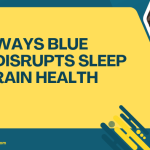Table of Contents
- Introduction
- 1. Insomnia
- 2. Sleep Apnea
- 3. Restless Legs Syndrome (RLS)
- 4. Narcolepsy
- 5. Circadian Rhythm Disorders
- Conclusion
- FAQs
Introduction
Sleep is a fundamental aspect of our overall health, crucial for both physical and mental well-being. Unfortunately, many people experience sleep disorders that can significantly affect their brain health and cognitive function. In this article, we’ll explore the top five sleep disorders, their neurological impacts, and what you can do to address them.
1. Insomnia
Overview: Insomnia is characterized by difficulty falling asleep, staying asleep, or waking up too early. It is one of the most common sleep disorders, affecting millions globally.
Chronic insomnia can lead to various cognitive impairments, including poor concentration, memory issues, and mood disturbances.
Neurological Impact: Chronic insomnia can lead to various cognitive impairments, including poor concentration, memory issues, and mood disturbances. Research indicates that prolonged lack of sleep can alter brain function, particularly in areas responsible for memory and emotional regulation. According to the National Sleep Foundation, insomnia can also contribute to conditions like anxiety and depression.
Management Strategies:
- Cognitive Behavioral Therapy for Insomnia (CBT-I): This is considered the first-line treatment and focuses on changing thoughts and behaviors related to sleep.
- Sleep Hygiene: Establishing a regular sleep schedule, creating a comfortable sleep environment, and avoiding stimulants before bed can help improve sleep quality.
2. Sleep Apnea
Overview: Sleep apnea is a serious disorder where breathing repeatedly stops and starts during sleep. The most common type is obstructive sleep apnea (OSA), often characterized by loud snoring.
Decreased oxygen supply to the brain can lead to cognitive deficits, mood disorders, and increased risk of stroke.
Neurological Impact: Sleep apnea can lead to decreased oxygen supply to the brain, causing cognitive deficits, mood disorders, and increased risk of stroke. A study published in the journal Sleep found that individuals with untreated OSA are at a higher risk for neurodegenerative diseases, including Alzheimer’s. For a deeper dive, check out the American Academy of Sleep Medicine.
Management Strategies:
- Continuous Positive Airway Pressure (CPAP): This device keeps the airways open during sleep.
- Lifestyle Changes: Weight loss, avoiding alcohol, and sleeping on one’s side can significantly improve symptoms.
3. Restless Legs Syndrome (RLS)
Overview: RLS is a neurological disorder that causes an uncontrollable urge to move the legs, usually accompanied by uncomfortable sensations, particularly in the evening or night.
RLS can disrupt sleep patterns, leading to insomnia and daytime fatigue.
Neurological Impact: RLS can disrupt sleep patterns, leading to insomnia and daytime fatigue. Studies have shown that individuals with RLS may experience alterations in brain function, particularly in the dopamine pathways, affecting mood and cognitive function. For more details, refer to the National Institute of Neurological Disorders and Stroke.
Management Strategies:
- Iron Supplements: Low iron levels can exacerbate RLS; supplementation may help.
- Medications: Dopaminergic agents and anticonvulsants are commonly prescribed.
4. Narcolepsy
Overview: Narcolepsy is a chronic sleep disorder characterized by overwhelming daytime drowsiness and sudden attacks of sleep. It may also include cataplexy, a sudden loss of muscle tone triggered by strong emotions.
The condition is linked to a deficiency in the neurotransmitter hypocretin, which regulates wakefulness.
Neurological Impact: The condition is linked to a deficiency in the neurotransmitter hypocretin, which regulates wakefulness. This deficiency can lead to impaired cognitive function, memory issues, and increased risk of accidents due to unexpected sleep attacks. Learn more at the Narcolepsy Network.
Management Strategies:
- Medications: Stimulants can help manage daytime sleepiness, while other medications can address cataplexy.
- Lifestyle Changes: Taking scheduled naps and maintaining a consistent sleep schedule can be beneficial.
5. Circadian Rhythm Disorders
Overview: These disorders disrupt the body’s natural sleep-wake cycle, often influenced by external factors such as shift work or jet lag.
Circadian rhythm disorders can lead to cognitive decline, mood disturbances, and increased risk of chronic diseases.
Neurological Impact: Circadian rhythm disorders can lead to cognitive decline, mood disturbances, and increased risk of chronic diseases. The brain’s biological clock regulates essential functions, and disruptions can lead to hormonal imbalances, affecting everything from metabolism to mood. The Sleep Foundation provides valuable insights on this topic.
Management Strategies:
- Light Therapy: Exposure to bright light at specific times can help reset the internal clock.
- Melatonin Supplements: These can assist in regulating sleep patterns.
Conclusion
Understanding common sleep disorders and their neurological impacts is crucial for improving overall brain health. By recognizing the symptoms and seeking appropriate treatments, individuals can significantly enhance their quality of life and cognitive function. Prioritizing sleep is not just about rest; it’s about nurturing your brain.
FAQs
Q1: How can I tell if I have a sleep disorder?
A1: Symptoms like persistent fatigue, difficulty concentrating, or disrupted sleep patterns may indicate a sleep disorder. Consult a healthcare provider for a proper diagnosis.
Q2: Are sleep disorders common?
A2: Yes, sleep disorders are quite prevalent, affecting millions of people worldwide. They can occur at any age and may have various underlying causes.
Q3: Can sleep disorders be cured?
A3: Many sleep disorders can be effectively managed or treated. The best approach depends on individual circumstances and the specific disorder.
Q4: How can I improve my sleep hygiene?
A4: Establishing a regular sleep schedule, creating a comfortable sleep environment, and avoiding screens before bedtime can significantly enhance sleep quality.
By taking proactive steps and understanding the connection between sleep and brain health, you can pave the way to a better night’s sleep and a healthier mind. Sleep well!
Also, consider checking out our articles on Top 5 Benefits of Regular Neuro Check-Ups for Your Health and Top 5 Tips to Reduce Screen Time for Brain Health for further insights on enhancing your brain health.






